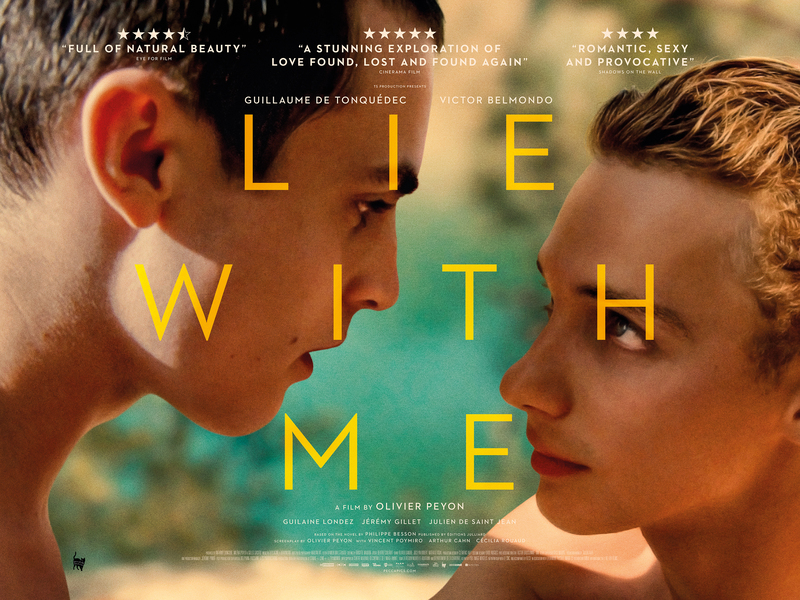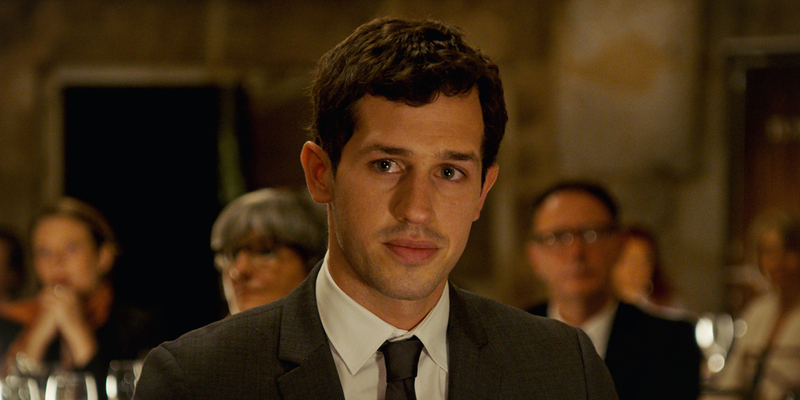
Review by
Benjamin Poole
Directed by: Olivier Peyon
Starring: Guillaume de Tonquédec, Jérémy Gillet, Victor Belmondo, Julien De Saint Jean

Angoulême light as deep and golden as the alcohol famously produced within
the region spills across the apricot shaded stubble of empty fields and
stark sable tree branches. Elsewhere in this establishment sequence of
landscape wide-angles, barred clouds bloom the soft dying day. Or, to
quote an actual French poet, "All suffocating/ And pale, when/The hour
chimes,/I remember/The old days/And I cry" (*swoons*), because in
Olivier Peyon's (with script collaboration provided by
Arthur Cahn, and based on the novel by Philippe Besson)
Lie with Me, we are situated within the autumn years of its central character,
Stéphane (Guillaume de Tonquédec), a famed author (in France, where
they, rightly, take such things seriously) returning to his adolescent
home of Cognac for the town's centenary. Along the way he experiences a
few memorial palpitations in his heart and his nether regions when he
meets the son (Lucas, Victor Belmondo - yep, Jean-Paul's grandson)
of his first, semi-forbidden, love. Can both come to terms with that lusty
season of decades ago which led to shame, recrimination and, seemingly, a
best-seller career for Stéphane?

The plot cuts between a pensive, pent-up Stéphane (in a town where
expensive sauce is offered up gratuit, the character pointedly doesn’t
drink) as he traverses the attendant celebrations of his hometown, and
back to the nebbish schoolboy Stéphane of the past who embarks on a
relationship with bit of rough Thomas (Julien De Saint Jean),
seemingly the only other gay in the village. Their relationship is marked
by subterfuge, clandestine meetings and, where Thomas is concerned,
conflictions and shame regarding their homosexuality. It is framed as
deeply exciting and sexy, yet halcyon too, as the teen boys meet at a
cinematically sun-kissed quarry lake to while away the days exploring each
other's bodies and hearts. No wonder that the steadfastly middle-aged
Stéphane of the future pines for the simpler, priapic pleasures of this
uncomplicated secret summer...
Perhaps the spectre of Thomas being so prominent to Stéphane's mindset
encourages him to recognise his long-ago lover in Lucas (in actuality he
looks exactly like the grandfather of the actor playing him), a tour guide
for Americans vacationing in the area. And, maybe, Lucas' supposed
unfamiliarity of Stéphane is a feint, with the young man himself angling
for answers about the estranged father he never really knew.

Lie with Me is a handsomely photographed film, with an easy
to grasp narrative concerning the past and illicit love, and, if your
expectations are calibrated to such straightforward expectations, the film
will slip down nicely. However, for others, the superficial, solipsistic
elements of Lie with Me may well render it unpalatable.
Besson's novel intentionally blurs the lines between what-happened and
what-elements-are-cannibalised-from-life-to-make-a-story with a dedication
to Thomas Andrieu, a character in the book and an irl person, who died two
years before the book was published in 2018. If Stéphane isn't an avatar
for Besson then the film certainly leads us to consider that he is and Lie
with Me duly revolves around the effect which the working class and darkly
beautiful Thomas had on the bourgeoise writer then and now. Farmhand
Thomas is idealised within the narrative, and his story, which with
Thomas' balance of school and hard labour/lust and shame is more
interesting than Stéphane's comparatively conflict-free existence, is
reduced to would-be poignant inspiration for budding writer Stéphane.

Ostensibly, it seems that the relationship of decades ago has
characterised Lucas' life, too, with the tour guide never bonding with the
father who didn't quite get over Stéphane. Or so we trust, because the
audience never gets close to Thomas, who is objectified as a fantasy
figure: good looking, strong and while certainly not as clever as bookish
Stéphane, is wise in a homespun manner, i.e. he encourages Stéphane's
writing. It's as if the film itself assumes that the life of a lowly
farmworker could never be as interesting as the life of a Parisian author
and his tender reminiscence.
I always feel sorry for people who romanticise their youth and their
"first love," because it is often an indication that said person is
unhappy in the now, and, at worst, have probably idealised those early
fumbles into a dreamy fiction which consoles with its unattainability. Of
course things seemed better then! You didn't have a house to keep, a job
to go to, an ever increasing loss of hope. A more interesting film would
examine the arrested development of Stéphane, and challenge the author's
evident ipseity, the glib assumption that other people are there to aid
and abet the künstlerroman development of The Author. This would offer a
tenebrous, uncomfortable edge existing alongside the visual textures of
sun dappled love making contrasting the hedonistic innocence of bedroom
dance scenes. Disappointingly, Lie with Me takes audience
complicity in its lovelorn nostalgia for granted.

Lie with Me is on UK/ROI VOD now.

